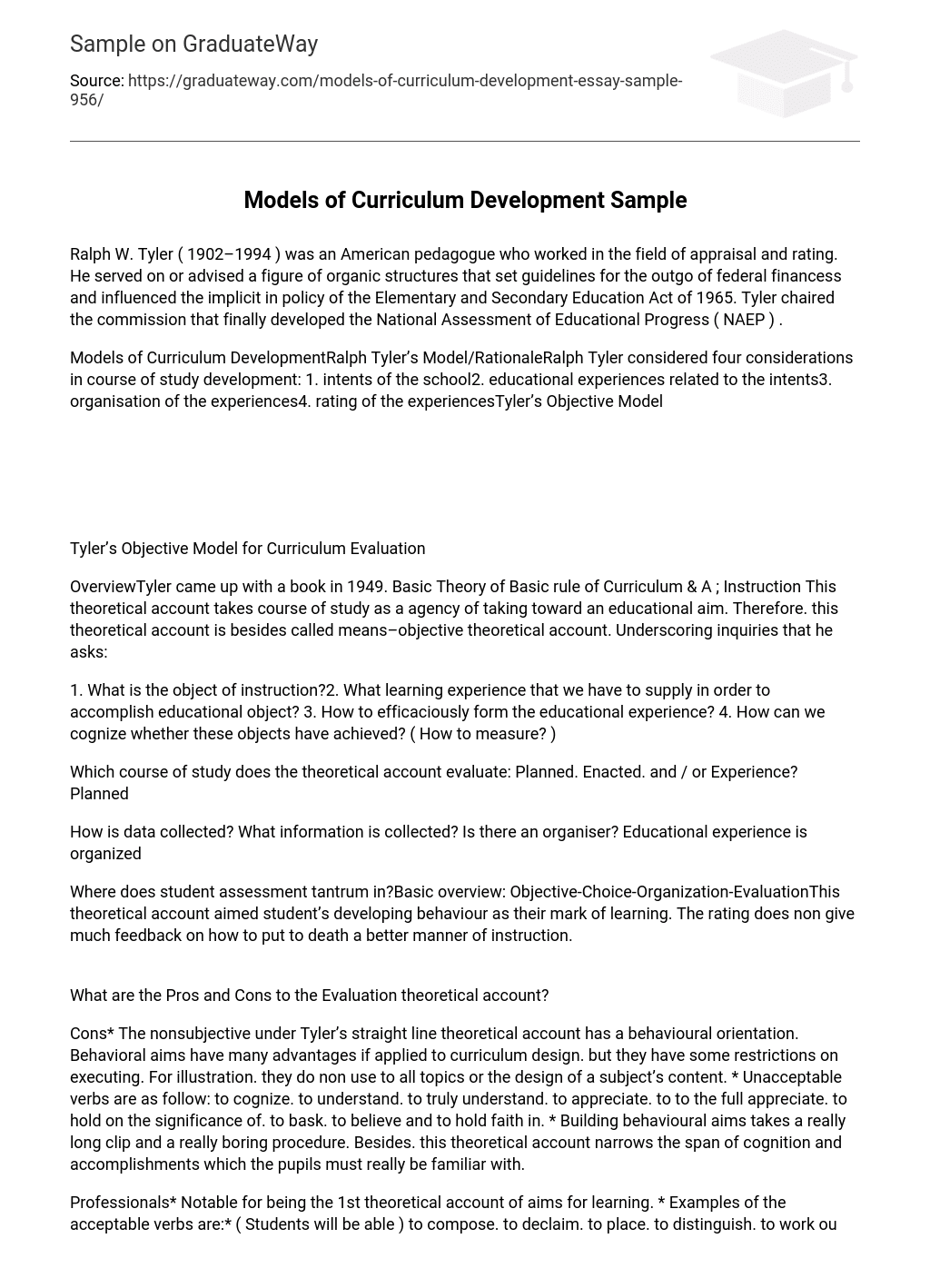Ralph W. Tyler ( 1902–1994 ) was an American pedagogue who worked in the field of appraisal and rating. He served on or advised a figure of organic structures that set guidelines for the outgo of federal financess and influenced the implicit in policy of the Elementary and Secondary Education Act of 1965. Tyler chaired the commission that finally developed the National Assessment of Educational Progress ( NAEP ) .
Models of Curriculum DevelopmentRalph Tyler’s Model/RationaleRalph Tyler considered four considerations in course of study development: 1. intents of the school2. educational experiences related to the intents3. organisation of the experiences4. rating of the experiencesTyler’s Objective Model
Tyler’s Objective Model for Curriculum Evaluation
OverviewTyler came up with a book in 1949. Basic Theory of Basic rule of Curriculum & A ; Instruction This theoretical account takes course of study as a agency of taking toward an educational aim. Therefore. this theoretical account is besides called means–objective theoretical account. Underscoring inquiries that he asks:
1. What is the object of instruction?2. What learning experience that we have to supply in order to accomplish educational object? 3. How to efficaciously form the educational experience? 4. How can we cognize whether these objects have achieved? ( How to measure? )
Which course of study does the theoretical account evaluate: Planned. Enacted. and / or Experience? Planned
How is data collected? What information is collected? Is there an organiser? Educational experience is organized
Where does student assessment tantrum in?Basic overview: Objective-Choice-Organization-EvaluationThis theoretical account aimed student’s developing behaviour as their mark of learning. The rating does non give much feedback on how to put to death a better manner of instruction.
What are the Pros and Cons to the Evaluation theoretical account?
Cons* The nonsubjective under Tyler’s straight line theoretical account has a behavioural orientation. Behavioral aims have many advantages if applied to curriculum design. but they have some restrictions on executing. For illustration. they do non use to all topics or the design of a subject’s content. * Unacceptable verbs are as follow: to cognize. to understand. to truly understand. to appreciate. to to the full appreciate. to hold on the significance of. to bask. to believe and to hold faith in. * Building behavioural aims takes a really long clip and a really boring procedure. Besides. this theoretical account narrows the span of cognition and accomplishments which the pupils must really be familiar with.
Professionals* Notable for being the 1st theoretical account of aims for learning. * Examples of the acceptable verbs are:* ( Students will be able ) to compose. to declaim. to place. to distinguish. to work out. to build. to name. to compare and to contrast. Model of Curriculum Development10/10/2011
Among the three Model Curriculum Development presented during the talks which is from Tyler. the Dynamic Model of Skillbeck and the Cyclical Model of Nicholls and Nicholls ; I would prefer Nicholls and Nicholls Model. I think it is more systematic in footings of the execution of the course of study. More organized than the others and more learner-friendly/centered. For the ground that most jobs will be analyzed exhaustively. nil will be skipped ( though sometimes it will be a waste of clip to analyse the things that are already all right in its context ) .
It is progressive in a sense that we can happen progression go oning among pupils. Because as I have said on the first portion of this paper. the Cyclic theoretical account focuses more on the scholars. If they found failures in the rating portion. they can still retrace the course of study and look into whether the choice of obj. or the other parts are non good for the scholars. Unlike the Tyler’s theoretical account where he focuses more on the aims instead that the scholars need. J And non unlike Skillbeck’s Model where in. opportunities are. we can lose our focal point on the things that needs more attending.
In Tyler’s theoretical account the nature of the scholar. value and purposes of society. and cognition of content filtered through the doctrine of instruction and the psychological science of instruction are considered in developing acquisition ends which so lead into the development of specific. appropriate aims for direction and acquisition. Ralph D. Simpson in his article on Tyler relates that at any flat competent pedagogues are 1s that consider the nature of the scholars entrusted to them. the nature of the society in which they work. and the nature of the topic or cognition base in which the direction is happening. I agree with his statement. It is relevant today to take all of these into consideration when believing approximately and be aftering how to assist our pupils today win. In Tyler’s model the instructional aims are aligned with the acquisition ends that are inherently connected.





